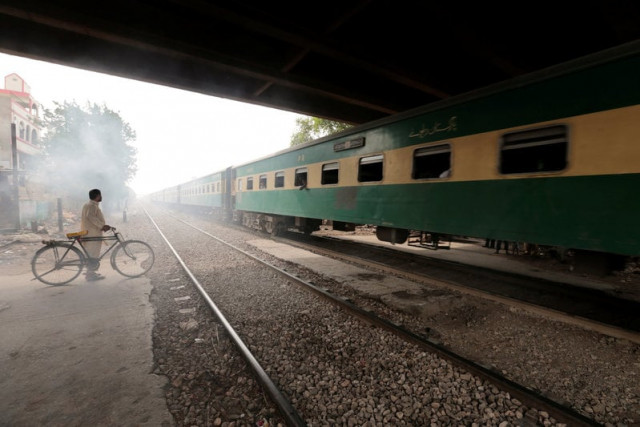Railway projects fail to win green light
Pakistan, China agree on CPEC long-term plan

Karachi Circular Railways. PHOTO: REUTERS
Unlike the past, this time Pakistan had to struggle hard to push its agenda amid domestic political uncertainty and China’s reluctance to commit for new projects. Progress on most of the items could not be achieved.
The framework agreement of $2 billion Karachi Circular Railways project and the financing agreement of $8.2 billion Main-Line-I of Pakistan Railways could not be signed during the 7th meeting of the Joint Cooperation Committee (JCC).
The design of $260 million New Gwadar International Airport could also not be finalised.
There was also a dispute over the site of setting up a Special Economic Zone in Khyber-Pakhtunkhwa, as Beijing was reluctant to accept the provincial government recommended Rashakai site in Mardan.
Planning Minister Ahsan Iqbal and Vice Chairman of the National Development and Reform Commission of China co-chaired the meeting of the JCC – the highest decision making body of the CPEC.
Centre hides long-term CPEC plan from provinces
The only major outcome of the JCC was the agreement over the Long Term Plan (2014-2030) that is expected to translate the national economic plans of both the countries into one policy document covering all common grounds for the socioeconomic cooperation.
“The final agreement on the 2030 long-term plan has been achieved,” said the minister for planning and development after the JCC meeting.
Pakistan did not accept China’s demand to introduce Yuan in the country.
But Iqbal said Pakistan would explore the possibility of using the Chinese currency for making payments for capital imports for CPEC.
The LTP is the most critical element of the China-Pakistan economic relationship, as it lays the foundation of cooperation in all economic and financial areas for decades to come.
Pakistan, China to treat all investors equally
The planning minister assured that the LTP final document will be made public, as the government did not have any intention to hide it. “The LTP is for Pakistan’s development and its full text will be released.”
He said that the LTP will help boost Pakistan’s productive sector through setting up Special Economic Zones. The minister said, “The agriculture sector has been specially focused in the LTP” and added, “Pakistan will also take advantage of advanced Chinese technology.”
He said that the information technology has also been made part of the LTP.
However, K-P Chief Minister Pervaiz Khattak expressed serious reservations over the LTP and the selection of the SEZ site in his province.
CPEC projects set to enter next stage of execution
“K-P has been ignored in the plan and many important nodes like Hazara, Malakand, Peshawar and Dera Ismail Khan have not been included in the LTP,” said Khattak while talking to the media.
He also showed surprise over the Chinese proposal to set up a SEZ at Hattar.
“This is my province and I want the special economic zone to be set up in Rashakai,” said the chief minister.
He said the feasibility study of the Rashaki zone was done and the provincial government bought 20,000 kanal land for setting up the zone.
“It is surprising for me that no feasibility study of Hattar was forwarded to China and yet it is pressing the case of Hattar SEZ,” said Khattak.
Khattak said that China was not setting up the SEZ for free in Hattar; therefore, it did not have a right to impose its will on the provincial government.
The Hattar site was on the eastern route of CPEC, which would not give any main benefit to the province, said the CM.
The planning minister supported the provincial government’s stance and said the special economic zones will be set up according to the priorities determined by the provincial governments.
At long last: Circular railway JCC meeting to be held in China
Due to some issues, the Framework Agreement of the $2 billion Karachi Circular Railways (KCR) project could not be signed.
Responding to a question, the planning minister said a team of experts has been constituted to finalise the feasibility study of the KCR. He said the 7th JCC has cleared the KCR project.
But two-day before the JCC meeting, CPEC project coordinator Hassan Daud Butt had said that the key deliverable for the 7th JCC was to sign the framework agreement of the KCR.
The financing agreement of the $8.2 billion Main Line-I (ML-I) project of Pakistan Railways also could not be signed.
The planning minister said the cost estimates of the ML-I were not final yet and both the countries would try to complete all formalities during the next three months.
For the New Gwadar International Airport, the main deliverable point for the JCC was to sign the project design.
“China is reviewing the design of the project and it is expected that work on the airport would begin by the mid of next year,” said the planning minister.
He said it was also agreed that work on other Gwadar projects would be expedited.
Responding to a question over inclusion of some new projects in CPEC, the minister said there was a need to expedite work on those projects that had been agreed upon in the 6th JCC.



















COMMENTS
Comments are moderated and generally will be posted if they are on-topic and not abusive.
For more information, please see our Comments FAQ